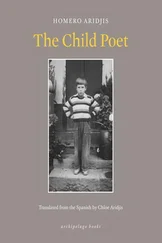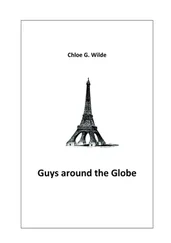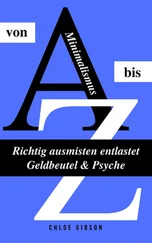From the outside the chateau looked dark and unhappy; rather than a proud survivor, it seemed to resent the fact it had survived.
The air closed in around us as we stepped from the garden into its bare, chilly shambles. During and after the Revolution, our guide explained, most of the building’s past had been effaced by both men and erosion, and now little more than its skeleton remained. Yet that skeleton, I saw, was full of character. Over the foot of a stairwell hung a mutilated coat of arms, as if its metal face had received multiple batterings. Between the eighth and eighteenth centuries a string of families — Cizelly, Pioche, du Vierne, La Ferté-Meung and Motte-Dreuzy — had reigned over the seigneury. But with each consecutive owner, our guide added, Challement had fallen into ever more dramatic disrepair and now so little was left, it required a real feat of the imagination to envision the place inhabited by anyone, the rooms so draughty even the ghosts would be blown about.
We climbed a claustrophobic flight of stairs, a segment of the balustrade dangling like a broken arm, and wandered through a set of abandoned rooms. Everywhere I looked, I saw signs of deterioration and decay, of wondrously indifferent dilapidation. Doorways without doors, window frames without panes, deep splintery gashes in the floorboards, gloomy yawning fireplaces, a smashed metal crib. Here and there, the walls and ceiling looked singed and the air smelled faintly of smoke. I pressed my hand against one of the cold walls, the only parts that seemed impervious to time, yet there too I noticed pockmarks in the stone and bits missing from the mortar. Long strands of cobwebs swayed in the corners of the rooms, the absence of windowpanes drawing in currents of cold air from outside. Our guide said it was as if time had stood still in the chateau, but no, on the contrary, everywhere I looked I saw signs of its passage.
At one point I heard the click of a door in another room but there were no doors. At another point, I thought I heard a window slam shut but there were no windows. It must have been the wind.
Back on the ground floor we explored more rooms. Up in the corners I noticed a multitude of nests and wondered whether they belonged to bats or birds who had come to winter inside, though the difference in temperature between indoors and outdoors was minimal. I pulled my coat tightly around me and stuck my hands in the pockets. Daniel had removed his gloves and was writing in his notebook. Pierre stood quietly beside him.
Towards the end of our tour, as we stood in an immense room with high ceilings, once a grand banqueting hall, our guide said, I caught sight of a sooty figure emerging from the fireplace and scurry out of the room. The thing seemed to detach itself from the stone like a shadow fleeing its owner. I cried out. Daniel quickly turned. After a second’s delay, Pierre turned too.
The guide asked whether something was the matter. I told him I’d just seen a creature, man or giant rat, I wasn’t sure, come out of the chimney.
‘Oh, that’s our chatelain,’ he answered calmly.
‘Your chatelain?’
‘The owner of the chateau. Half the fee you paid goes to him.’
We wanted to hear more. He hesitated. We clamoured. He hesitated. Daniel said we were soon leaving France, had come all this way, and wanted to depart with something more than what we’d just seen. His words seemed to work.
So, as we stood with our arms huddled into our chests there in the banqueting hall that seemed to grow ever more gusty, we were told the tragic story of Marc Cointe, the chatelain of Challement.
Marc Cointe, the man you have just seen, began our guide, was born into the wrong family and the wrong fate. He would have been better suited for just about any other life than the one he was handed. He detested all the trappings on which his family name was embossed yet it was as if the very lines of his life were in the silver before he was even born. As an only child he rode his wooden horse in the meadows and played with the fish and newts in the pond, but by the time he turned fifteen and searched in vain for friends beyond this little kingdom — he had private tutors, no formal schooling — his feelings towards his privileged background began to evolve in complicated ways.
Sadly, nothing was to change. Cointe spent his entire life on the grounds of the chateau, with only two visits to Paris and one to Provence. Yet he was extremely cultivated, the villagers said, and well read.
But a nihilist.
At his father’s funeral he kept his distance, watching from under a tree as the coffin was lowered into the earth by four men, and then drank himself into a stupor in the library. When his mother died a year later, he watched her funeral from a castle window. Both parents were buried in a grove thirty strides from the house but no one ever saw him visit the site.
Cointe had informed opinions on everything — he could hold his own in any debate — but he never wrote anything down. It was enough to share the fruits of his thought with a drunken audience of three: the local farmer, the local welder, and the master of keys of the canal lock.
Until the age of thirty-five, our guide said, the chatelain had liked to entertain. On Friday nights he would invite acquaintances, for they were never true friends, from the village to sample the exquisite vintage wines in his vast cellar, bottles amassed by relatives over the decades. Before long, the contents of his entire cave were depleted, and while drinking down the wine, it was said a favourite pastime was to toss eighteenth-century Meissen plates into the air and shoot at them with an antique rifle, shards of porcelain flying asunder. Other family heirlooms met a similar fate.
In those years the chatelain of Challement kept a flock of sheep on the grounds, twelve creatures to which he was famously attached, but one January he slipped into a three-day alcohol coma and when he resurfaced he found them all dead, frozen into different poses, some belly up in the snow with their hooves skywards as if already on their ascent towards animal heaven. He dug a trench, penitently gloveless as he worked, and buried them near his parents.
The years wore on. Marc Cointe grew a beard, stopped washing, and inched closer and closer to clochard -dom, our guide continued. His entire inheritance had vanished in drink and nothing remained for the heating or upkeep of the chateau. His cousin, who since childhood had had his sights on the family home, despaired, but there was no legal way of intervening.
The chatelain lost interest in human company. He withdrew from the world and stopped receiving people. Cigarettes, budget wine and round-the-clock fires became his favoured companions. Now wary of everyone, even the master of keys of the canal lock, he rarely answered the door and when he did would be clutching a rusty shotgun. Excursions were limited to weekly visits to the village, where he ran up enormous tabs. The shop owners took pity; some had known him as a child.
Good use was made of all the magnificent fireplaces in the chateau, our guide went on, encouraged by how intently we were listening. The following winter, having already sacrificed two dozen oaks from the estate to make fires, the chatelain began to chop and burn his own furniture. At night the villagers could see steady threads of smoke emerging from the chimneys. After the furniture came the window frames, every door except the main one, and the wood panelling. Then the family portraits. And, finally — he had no choice — the library, until all that was left were a few sacred volumes. Hundreds of books, part of centuries-old collections bound in leather, went up in flames. He had to keep warm.
Over the past few months, the guide said, his descending tone signalling he was nearing the end of his tale, Marc Cointe no longer had a bed (the wood from his four-poster lasted nearly three days) and would sleep inside a mattress in one of the fireplaces. That was where I’d seen him emerge, roused from his slumber, most likely, by our sounds.
Читать дальше












